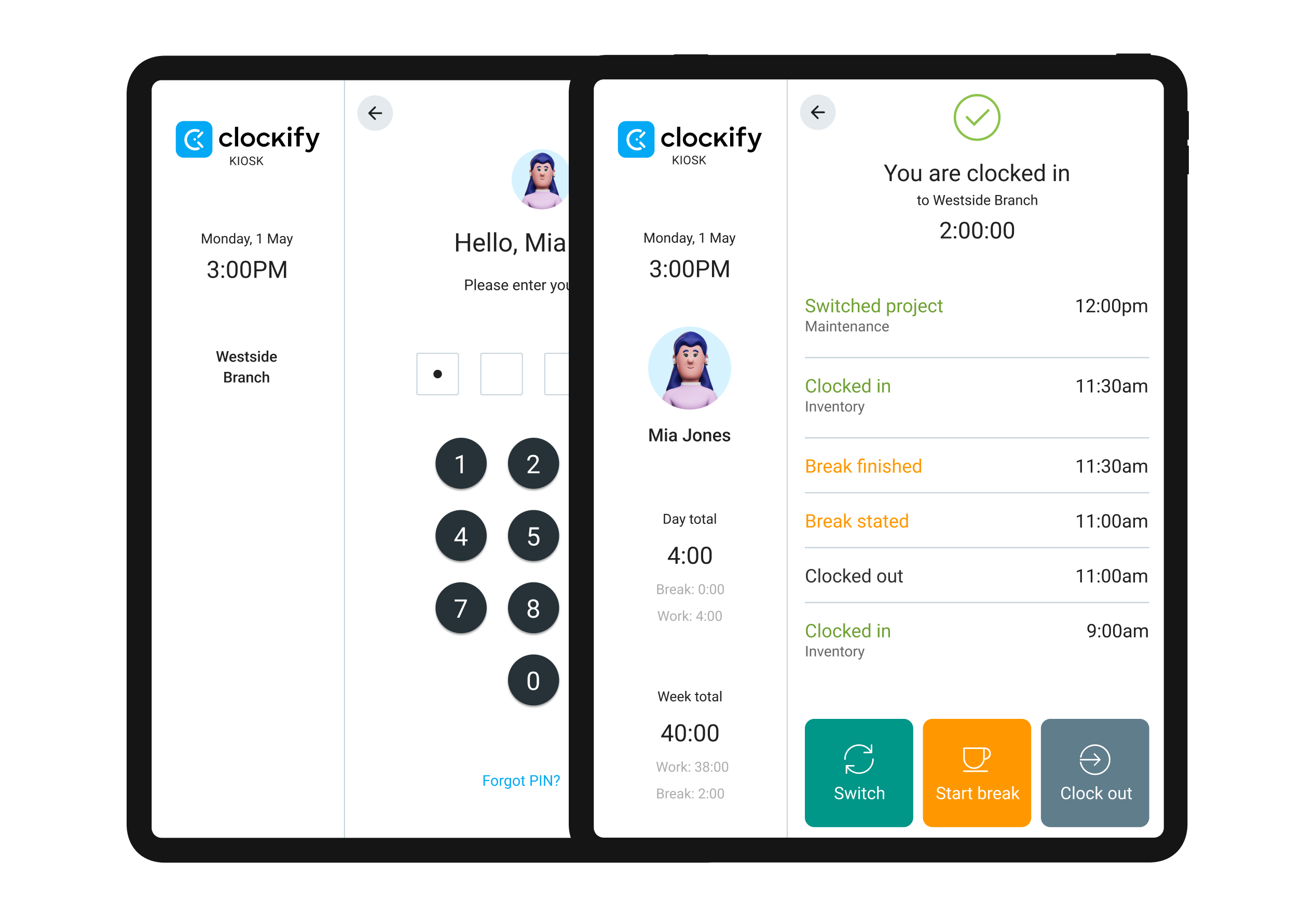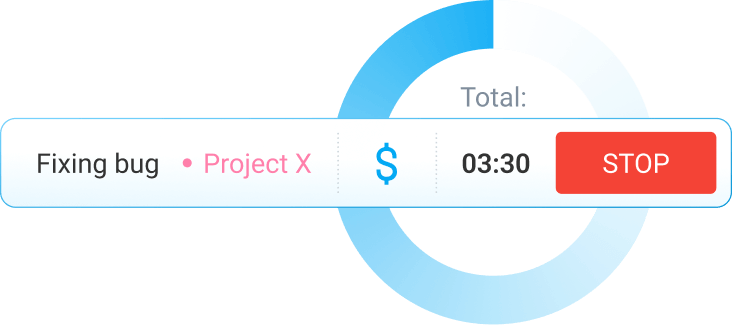Working Off The Clock: Why It’s Illegal and How to Prevent It
How often do you check your email even after you finish working? Did you know that spending time in your inbox when you shouldn’t be working counts as an off-the-clock work activity?
Most worryingly, as many as 85% of employees receive work-related communications outside standard work hours at least a few times a month.
The consequences of off-the-clock work can easily lead to:
- Back wages,
- Double damages,
- Civil audits and penalties from the Department of Labor (DOL), and even
- Class or collective actions.
To help you avoid this, let’s take a look at what constitutes working off the clock and the best practices to ensure labor law compliance.

What is working off the clock?
Off-the-clock work is work employees perform outside their working hours for which they aren’t compensated. This type of labor doesn’t contribute to overtime pay and can include any activity that benefits the employer and is part of the job — like responding to work-related emails or messages.
Working off the clock refers to any work performed outside official shifts (before or after official working hours) — without compensation.
Despite not being paid, people work off the clock far more often than many realize. From the 85% of people who receive work messages after work, only 6% never respond to them outside working hours, according to the 2025 Work-Life Balance Statistics.
The most common types of off-the-clock work activities
Here are some of the most common types of working off the clock:
- Pre-shiftwork — activities like truck warming or loading, worksite preparation, or carrying job equipment.
- Post-shiftwork — cleaning up the workspace, equipment, and tools, finishing tasks that should be done by the end of the shift, or returning equipment.
- Administrativework — doing paperwork, attending meetings, reviewing work documents, taking work calls, and answering work emails or messages outside of employees’ working hours.
- Rework — when employees are required to redo the project or fix project errors without getting paid.
- Waiting for the next job assignment/project — when workers have to wait for their next tasks or projects.
- Working during lunch breaks — when, instead of taking a lunch break, employees have to take care of assignments such as answering the phone, working on a computer, or replying to customer or client questions.
US federal law doesn’t enforce lunch or coffee breaks. But certain states have laws that require rest periods. So it’s always best to check your state laws to see whether employees are entitled to a break.
Regardless of federal law, employers may choose to offer employees breaks. In that case, breaks of up to 20 minutes are part of compensable work hours and must be covered by the total hours worked per week.
But, keep in mind that if your employer offers you a lunch break, you “must be completely relieved from duty for the purposes of eating regular meals.” Otherwise, your employee could be charged for violating the Code of Federal Regulations.
Working-off-the-clock laws
According to the Fair Labor Standards Act, “time spent doing work not requested by the employer, but still allowed, is generally hours worked, since the employer knows or has reason to believe that the employees are continuing to work and the employer is benefiting from the work being done. This time is commonly referred to as ‘working off the clock’.”
Additionally, under the standard FLSA workweek of 7 consecutive days, any hours beyond 40 per week count as overtime.
All non-exempt employees must be paid for all hours worked, including overtime and off-the-clock work. And since working off the clock means working more than 40 hours per week, the FLSA demands that non-exempt employees “receive at least the minimum wage and at least one and one-half times their regular rates of pay for hours worked over 40 in a workweek.”
Exempt employees, on the other hand, aren’t eligible to get overtime pay.
🎓 Fair Labor Standards Act (FLSA) Regulations
Working off-the-clock laws for employers
Employers who send emails or texts to employees outside their working hours, without paying them for off-the-clock work, commit an FLSA violation. In fact, encouraging off-the-clock work while not paying your non-exempt employees for these activities is illegal.
To avoid legal consequences, lawyers recommend that companies adopt a transparent off-the-clock work policy. This policy should:
- Contain details on when employees are allowed to work overtime and off the clock, and
- Mandate managers to record and report overtime and off-the-clock work.
To make sure everyone clearly understands overtime and off-the-clock work policies, it’s best to organize training sessions for employees and monitor for potential violations across the company.
Working off-the-clock laws for managers
If you're a manager, you need to be aware of any off-the-clock work your employees are performing. Besides, make sure that these employees are compensated for working off the clock.
Sometimes, however, managers are the ones who work off the clock. In this case, they should make sure the employer knows they’ve been working extra hours.
Just like employees, managers need to be compensated for their off-the-clock work too.
Working off-the-clock laws for employees
If you’re an employee, you need to follow your company’s off-the-clock work policy. The best option is to record your hours whenever you work off the clock by using an overtime tracker.
You should also remember to notify your manager of any off-the-clock hours worked.
In case you weren’t paid for working off the clock, you have the right to file a complaint with the Department of Labor. Under FLSA regulations, you can recover unpaid wages for up to 3 years. Apart from that, you can get liquidated damages and recover your attorney’s fees.
If you’d like to learn more about this, check out the official website of the US Department of Labor, where you can find out more details on how to file a complaint.
🎓 Overtime Laws by State — Comprehensive Guide for 2025
What happens when employees work off the clock
If you’ve ever considered staying up late just to meet a deadline, you must have had dozens of questions regarding the decision to work off the clock.
But are the concerns about off-the-clock work really justified? Let’s address some of the most common ones.
Question #1: Is it illegal to work off the clock?
Employers could face legal consequences for not paying their employees for off-the-clock work.
According to FLSA, “employers failing to identify, record, or compensate off-the-clock hours spent by employees performing compensable, job-related activities” are at risk of litigation. In fact, work includes not only the main job description but also any related tasks.
Attorney at law and our expert interlocutor, Christopher Migliaccio, states that every task performed at work counts, no matter how small:
With regard to keeping time accurately at work, Christopher said that “timekeeping records that aren’t properly maintained put the employer in the position where they must prove there was no work performed with evidence.” He adds that employers can protect themselves by mandating time tracking.
You can use a work hours tracker like Clockify to help ensure that employees get paid and the employer complies with FLSA regulations.
Question #2: Can you get fired for working off the clock?
Although getting fired for off-the-clock work is possible, to find a clear-cut answer to this question, you need to be familiar with your company’s policy.
Certain companies have a separate clause in their employment contract regarding the authorization of overtime work. The clause might stipulate that if an employee doesn’t request authorization and works off the clock without reporting those hours, the employer may terminate the employee.
But because the FLSA requires non-exempt employees to be compensated for all hours worked, even if an employer announced that overtime isn’t allowed, the employer would still need to pay an employee who worked off the clock.
To avoid getting in trouble for working off the clock, pay attention to whether the overtime requirement is included in your contract.
🎓 Average Working Hours (Statistical Data 2025)
Question #3: Can your boss monitor what you do off the clock?
Employers aren’t allowed to probe into their workers’ lives outside working hours. Some states even regulate this matter by enacting a right to privacy. This regulation prohibits employers from investigating employees’ off-duty activities unless an employee is in trouble for illegal conduct that directly affects the employer.
Although your employer doesn’t have the right to investigate or access personal information, using your work computer for private purposes still compromises your privacy. If you log in to your private accounts on your work computer, you can’t expect to maintain privacy, as employers are legally permitted to monitor all work devices.
Question #4: Are there more disadvantages to working off the clock?
Beyond the legal consequences of working off the clock, the most common additional off-the-clock work disadvantages include:
- Added tension in teams,
- Increased chance of burnout, and
- Increased stress levels.
According to a recent IWH study, working unpaid overtime was associated with higher stress and burnout than not working unpaid overtime.
In practice, these effects often accumulate subtly before escalating as one or several chaotic events. It’s important to keep these risks in mind before even thinking about working off the clock.
Question #5: Are there cases when off-the-clock work is allowed?
There are cases when off-the-clock work is allowed, but these usually involve minor tasks.
Let’s say you received a promotion and need to move to another work area. Since the new position requires you to use new tools, you’ll spend a couple of minutes moving them to your new workspace.
The time you spend on a minor work-related activity is called de minimis time. Although employees invest some time in a task, de minimis usually involves “infrequent and insignificant periods of time beyond the scheduled working hours, which cannot as a practical matter be precisely recorded for payroll purposes.”
However, note that the exact definition of de minimis can vary, and some states may be stricter than others.
🎓 Mandatory Overtime: What You Need to Know
How can employers prevent working off the clock?
Sometimes, spotting off-the-clock work can be tricky, especially with flexible work schedules and remote working.
But some steps can be taken to ensure working after hours doesn’t become standard practice. Good strategies paired with new technologies often work best to address off-the-clock work and maintain compliance.
Let’s see how it’s done.
Tip #1: Introduce a modern time tracking solution
Although business communication apps have significantly increased the frequency of micro-tasks performed after work (such as message responses), modern on-site or remote time-tracking tools provide a solution that benefits both employers and employees.
Your employees may check their inboxes even after leaving the office, or work during their lunch break. If you’re unaware of your team’s off-the-clock work habits, not only are you silently promoting unwanted behavior, but you’re also risking a potential lawsuit.
Since you can’t address what you don’t know, encouraging your team to track their time can give you an overview of everyone’s work hours.
Apart from that, if you’re using a time-tracking app to stay on top of your team’s work habits, you’ll be able to spot any potential time eaters that lead your team to work overtime by taking a quick glimpse at your team’s workday.

The data you compile once your team is in the habit of tracking their time helps you reorganize the workflow to prevent after-hours work and identify (and address) this issue as soon as it occurs.
Still, keep in mind that you’ll have to communicate to your team members that they need to track every work-related activity to prevent any off-the-clock activity from passing unnoticed.
In any case, it’s up to the employer to ensure that off-the-clock work isn’t being done. Although there are many ways to ensure this, a combination of clear policy communication and limiting work tool access after hours often works best.
Tip #2: Institute clear policies
Sometimes, employees engage in off-the-clock activities because they’re unaware that such activities aren’t permitted.
Having a transparent off-the-clock policy that all employees are familiar with is a step toward eliminating off-the-clock work.
Start by defining which work-related tasks are strictly prohibited outside work hours. For example, you might want to prevent your employees from sending emails after hours. If that’s the case, make sure to clearly state that such work activities aren’t allowed outside of work time and elaborate on the consequences that go with engaging in off-the-clock work.
Also, instruct managers to prevent assigning new work tasks to team members after they clock out.
Powerful tools like Clockify let you configure your work tracking so that time entries require manager or admin approval on a weekly, monthly, or semi-monthly basis.
Tip #3: Improve team time management
Let’s say you’ve introduced an off-the-clock work policy and encouraged your team to track time. But you still notice everyone struggling to complete their tasks within regular working hours.
When this happens, the main culprit may be poor time management.
The good news is that this, too, can be fixed. But the solution might depend on the root cause of this issue. Perhaps your team struggles to track deadlines and repeatedly works late to make up for lost time.
To prevent deadlines from sneaking up on your team, you can make them more visible by putting them up on a digital board or by creating to-dos with clear deadlines in a project management app.
If your team is well aware of their deadlines, but everyone’s struggling to finish their tasks on time, your best shot is to schedule an open conversation with your employees. A discussion with your team could reveal the stumbling blocks preventing employees from managing their time and completing their tasks on time.
As soon as you discover where your team stands, it will be much easier to work through a solution and lead your team to brush up on their time management skills.
🎓 14 Proven ways to improve team time management
How do countries worldwide prevent working off the clock?
One of the best ways to prevent working off the clock is to prohibit off-the-clock communication between employers and employees. Today, this is ensured by strict laws, technologies that block access to work apps, or a combination of both.
Many countries around the world have already regulated this field by proposing or adopting the right to disconnect. Let’s look into that next!
Preventing off-the-clock work in the United States
In 2018, New York City Councilman Rafael L. Espinal proposed a Right to Disconnect bill. The proposed legislation would apply to private employers — and it would be illegal for them to require employees to check their electronic communications off-duty. Employers would still have the right to call their employees after work, but employees wouldn’t be obligated to answer.
Years later, the bill hasn’t been adopted, so it remains unclear whether US employees will gain the right to disconnect in the near future.
Preventing off-the-clock work in France
Similar to other countries, France’s right to disconnect was adopted in 2017 to ensure that all work-related communication happens only during official working hours. This legal right applies to French companies with more than 50 employees.
Preventing off-the-clock work in Germany
Even before Germany’s legal regulations on off-the-clock communication, companies in the country often regulated this practice internally.
One example is the well-known Volkswagen policy of shutting down email servers from 6.15 p.m. to 7 a.m., established in December 2011.
Since 2022, all German employers have been obligated to implement a system that records employee working hours.
Preventing off-the-clock work in South Korea
Since 2018, the South Korean government has started a shutdown initiative for government employees. Every Friday at 8 p.m., all working computers are shut down to prevent overtime.
However, not all employees have this privilege — 67.1% of government workers are exempt from this rule.
Preventing off-the-clock work in Portugal
Although the Portuguese government rejected the right to disconnect, it has decided to prohibit employers from contacting employees outside their regular working hours.
Since January 2022, sending a quick email to an employee after they have clocked out has been strictly prohibited in Portugal.
Violating this law can result in a penalty for the employer.
Preventing off-the-clock work in Slovakia
In 2021, Slovakia introduced the right to disconnect to help remote employees achieve a better work-life balance.
So, after they clock out, Slovakian remote employees have every right not to be available and not to use any work equipment.
If their employer requires them to work late or wants to get in touch with them during their time off, employees have the right to refuse.
🎓 Work-Life Balance Statistics for 2025: Global Trends
Preventing off-the-clock work in Italy
Ever since 2017, Italian “smart workers” (workers with flexible arrangements) have been granted the right not to engage in work-related communication outside their official working hours.
The law also requires employers and employees to implement technical and organizational measures to ensure employees are disconnected from work technology outside defined working hours.
Preventing off-the-clock work in the Philippines
Since 2017, the right to disconnect has been recognized in the Philippines. In short, it requires employers to “establish the hours when employees are not supposed to send or answer work-related emails, texts, or calls.”
If employees choose not to answer a work-related call or reply to a work email after work hours, they won’t be disciplined.
Working off the clock FAQ
Finally, let’s review some additional questions commonly asked about off-the-clock work.
Can I voluntarily work off the clock?
No, you can’t voluntarily work off the clock without your employer’s permission. In fact, your employer can face serious consequences that can trace back directly to your off-the-clock work.
Our expert interlocutor and HR executive, Colleen Moore, shared her experience with one employee who routinely worked late. According to Moore, the worker argued that they “did not mind working off the clock, because they had nothing else to do.”
Moore shared with us that she had to inform the employee that continued off-the-clock work could lead to progressive discipline, despite the work being the employee’s idea.
As Moore states, the worker can’t choose to work for free:
What happens if you leave your work without clocking out?
Leaving work without clocking out can cause trouble, depending on the technology used by your employer. The chosen software or system may continue to log hours even after you’ve left your work location or workstation.
Most commonly, this one-off error can be corrected by notifying your manager.
However, it’s very important to address the issue quickly, so that the recorded time can be set straight before it escalates — like affecting your payroll or being audited and flagged as intentional time theft or fraud.
🎓 How to Set Up a Clock-In Clock-Out System at Work
Is working off the clock an OSHA violation?
Working off the clock is not an OSHA violation. OSHA violations relate to rules regarding workplace safety.
Working off the clock is a wage-and-hour problem under the Fair Labor Standards Act (FLSA).
What’s the longest shift you can work legally?
For most industries, there’s no defined maximum shift length on a federal or state level.
However, a meal break might be mandated, depending on your state. For example, meal period rules kick in after 5 hours in California, and a second meal period is mandated for 10+ hour shifts.
Keep in mind that any hours above 40 in a single workweek are considered overtime under federal law, and some states also count daily overtime hours.
Can I get fired for something I did off the clock?
Yes, in some cases, disciplinary action (and even termination) is possible if you work off the clock.
Make sure to follow your company’s off-the-clock policy, track your hours, and notify your manager and employer of any issues to remain compliant with work-time requirements.
Track time at work to remain FLSA compliant — with Clockify
Given the many ways off-the-clock work can occur and legally compromise a business, implementing time tracking is essential in the modern workplace.
Whether you’re running a hybrid, remote, or on-site work model, Clockify tracks work time, projects, and performance by the hour.
If you’re an HR manager, payroll manager, or a compliance officer, you’ve probably experienced the pain of excessive administrative work and relying on spreadsheets to verify, approve, and process time for payroll.
Clockify handles manual time tracking by allowing employees to log their own time and administrators to review and verify accuracy.
You can also simplify clocking in and out with Clockify’s kiosk while reducing human error. This functionality allows you to:
- Implement clocking in and out online or on a dedicated device on-site, and
- Set a session duration so that your users can’t clock out late.

Our reliable tool also provides insights into time-tracking issues, such as when someone is under or over their time target.
This way, you can address any potential time-tracking problems the day after they happen, which significantly reduces the chances of being caught off guard during an unannounced DOL investigation.
Choose Clockify to reduce exposure to wage-and-hour lawsuits arising from uncompensated off-the-clock work and take control of your workforce costs with clear data.
Clockify is a part of CAKE.com. If you’re looking to digitally transform your workspace and simplify processes, make sure to check out CAKE.com’s Productivity Suite, which includes the Clockify time tracker, the Pumble team communication app, and the Plaky project management app.


